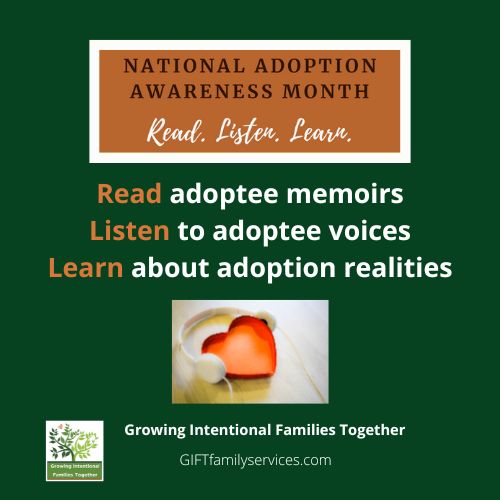
During this month of promoting awareness of adoption, we adoptive parents have a unique opportunity to immerse ourselves in listening, learning and validating what our children tell us about what it is like to be adopted. Listening and loving are inextricably connected. Remember David Augsberger’s words: “Being heard is so close to being loved that for the average person they are indistinguishable.[1]”
Listening and loving pave a path to mutual knowledge and understanding and discovering who we are as individuals and as family members. This awareness is an appropriate goal because it leads to understanding and empathy both of which are desirable in a parent/child relationship. It enables us to see and validate our children’s experiences.
Validation of our children’s experience is respectful and loving. Dr. Christian Conte asserts that the goal of validation is to connect.[2] I repeat: the goal of validation is to connect. As adoptive parents, we value connection and attachment.
As adoptive parents, we value connection and attachment. As Intentional Parents we recognize that validation, connection, and attachment result from intention, commit, and persistence, not happenstance. We recognize that this deep connection grows from repeated serve-and-return interactions in which our children experience and feel validated, seen, and heard. The daily interactions and conversations which we share build a history together and create an emotional and relational sweet spot, a sense that we “get them” and accept their true selves. On this basis, our kids determine what and when they feel they can safely discuss with us. They ask themselves what they can safely share about being adopted.
As parents, we have a chance to create a sense of security and openness that convinces them that we are capable and want to know all their thoughts, that we are strong enough and have enough love, not just the pretty but also the bittersweet, the hard to hear, the awkward and the agonizing. These conversations are not idle time-passers, they are the channel by which we connect deeply with our children, hearing their truth in all its complicated glory. To grow genuine, healthy, and resilient bonds, our mutual exchanges must reflect truth. Love flourishes in the rich soil of truth.
We consciously avoid playing “911 Fix It” and resist the inclination to minimize or counterbalance any of their challenges with “yes buts.” Knowledge comes through awareness. To become aware, we must listen. Truly listen. If they tell us they feel like their world is falling apart or that nobody likes them or any number of ways in which they judge themselves as coming up short, they want to believe that we heard what they shared. An appropriate response might be, “Wow, that must feel pretty horrible – or scary or hopeless… The specific words will vary just ensure to acknowledge their words, even if our perception is the opposite of theirs, at this point this difference is irrelevant. The message we want to make convey is, “We hear you. We see the picture you are painting and how it is making you feel. And we want to stand with you.”
Adopted persons have a life-long, soul-shaking awareness that family fracture can occur. This awareness is based on personal experience. Their personal experience. It already happened once to them. Many adult adoptees reveal that as children, they stuffed their worries and concerns deep within themselves. They resisted talking about it because they couldn’t take a chance that they could be rejected by their adoptive family as well. This fear and reluctance denied them the support of loving and understanding parents to help them work through their issues. It meant that their relationship was a roleplay based on a shared agreement they could only “accent the positive and eliminate the negative.” By placing a mask of everything is all right over their inner turmoil, they averted rejection. It robbed them of an intimate truth-based, relationship that could accommodate the spectrum of adoption complexity. Safe but insolated…isolated.
Intentional parents recognize the effort required to build intimacy and to dare to be vulnerable. We see the courage our kids demonstrate when they share their complete truth. We honor and appreciate it. As Intentional Parents, we see their honesty as the gift that it is and therefore, we encourage this kind of intimacy not shy away from it. Our children’s confidences are sacred; it costs them a lot to share them with us and they depend on us to honor that trust with the gravity and respect it deserves. This is their hope. Even if it is hard for us, we can see that it is even harder for them and so we extend our arms, open our minds, and enfold them with our love. We made a promise to our kids when they joined our families to be a safe, loving, permanent family is to embody the elements of Adoption-attunement. One of the best ways we can honor that promise is to immerse ourselves in the elements of Adoption Attunement.
What will you do this week, this month to nurture this awareness and to strengthen attunement with your kids?
So, for the remainder of National Adoption Awareness Month let us focus on strengthening our relationship with our kids. Listen. Learn. Love.
[1]Augsberger, David, Caring Enough to Hear and Be Heard, Regal Books, 1982
[2]”Yield Theory of Handling Conflict,” Dr. Christian Conte, Sounds True, www.soundstrue.com
___________________________
- Call us at 1-800-653-9445
- Listen to our podcasts: Adoption Matters: Real People. Real Life. Real Talk and Essentials of Adoption Attuned Parenting
- Watch our YouTube channel
- Read Books written by our coaches
- Click to learn more about Adoption Attuned Certified coaching!



